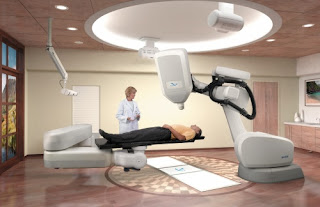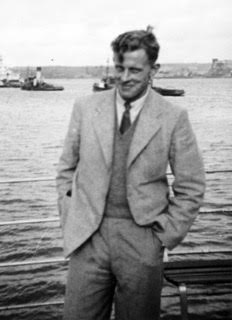Looking for the X-factor in radiotherapy

Radiotherapy: a constantly evolving technology
As I've said before somewhere I don't want to go banging on about cancer. After all, I'm supposed to have had the nearest thing to a cure. But I have joined the local Prostate Cancer support group, and do tend to check with male friends to make sure they know their PSA score. So inevitably there will be the odd mention of this annoying disease on the blog, and probably of others!
On the face of it there's always good news from the front line in the battle against cancer, and it's impossible not to be optimistic about the final outcome.
That was certainly the underlying message from clinical oncologist Dr Denise Sheehan, who spoke to the Budleigh & Exmouth Group of the North & East Devon Prostate Support Association at their 12 October meeting in Tidwell Manor about her work with radiotherapy for dealing with prostate cancer.
The story of radiotherapy as a treatment for cancer has been one of steady progress since the early days following the German physicist Wilhelm Röntgen's discovery of X rays in 1895. With no way of accurately judging either the amount of radiation to kill a tumour, or the precise area to be targeted effectively so as to avoid damage to surrounding tissue, it was a very hit or miss affair.
It seems that ignorance was bliss for both patients and doctors in those early days: while the angry red patch of skin which followed a course of radiotherapy was a sign that the treatment might have worked it also hid all the possible unfortunate side-effects of the radiation.
Not until the late 1950s was a more accurate approach possible with the introduction of the linear accelerator, now used for Intensity-Modulated Radiation Therapy (IMRT), and only in the last 30 years has proper investigation of a tumour prior to radiotherapy been possible thanks to the CT scanner.
Ironically there's a bittersweet element to all this of course. How many of us have lost a friend or relative to cancer only to read, often just a few years later, of an improvement in treatment which would have made all the difference.
Similarly, as radiotherapy for the treatment of prostate cancer becomes ever more sophisticated, improvements in delivery or the amount of radiation to a tumour mean that the cancer is more likely to be eliminated for good. And the side effects suffered by patients who underwent treatment only a few years ago are now less likely to occur thanks to the advance of science. Some previously irradiated former patients listening to all this were by now wondering whether they'd received the right dose!
Funding, as always, seemed to be crucial, Dr Sheehan implied. There is, she told us, a national shortage of medical physicists, the people needed to develop scanning techniques for improved targeting as well as to devise ways of finding out if a particular patient will respond badly to a particular type of radiotherapy.
As for the immediate outlook in radiotherapy techniques Dr Sheehan said that High-dose rate brachytherapy (HDRB) was "a developing field." Inserting and then removing a source of high energy radiation directly within the tumour, using radioactive wires, means that delicate areas such as the urethra can be avoided, reducing the likelihood of side-effects like incontinence. The technique has been used in combination with external beam radiotherapy in the past, but it seems possible that HDRB on its own could be used in the future.
For a cancer patient with little medical knowledge but lots of trust in the doctors one can only feel enormous admiration for oncologists like Dr Sheehan who play such an important role in the fight against this killer disease.
For more information about the North & East Devon Prostate Support Association click on http://www.nedpsa.org.uk/
As I've said before somewhere I don't want to go banging on about cancer. After all, I'm supposed to have had the nearest thing to a cure. But I have joined the local Prostate Cancer support group, and do tend to check with male friends to make sure they know their PSA score. So inevitably there will be the odd mention of this annoying disease on the blog, and probably of others!
On the face of it there's always good news from the front line in the battle against cancer, and it's impossible not to be optimistic about the final outcome.
That was certainly the underlying message from clinical oncologist Dr Denise Sheehan, who spoke to the Budleigh & Exmouth Group of the North & East Devon Prostate Support Association at their 12 October meeting in Tidwell Manor about her work with radiotherapy for dealing with prostate cancer.
The story of radiotherapy as a treatment for cancer has been one of steady progress since the early days following the German physicist Wilhelm Röntgen's discovery of X rays in 1895. With no way of accurately judging either the amount of radiation to kill a tumour, or the precise area to be targeted effectively so as to avoid damage to surrounding tissue, it was a very hit or miss affair.
It seems that ignorance was bliss for both patients and doctors in those early days: while the angry red patch of skin which followed a course of radiotherapy was a sign that the treatment might have worked it also hid all the possible unfortunate side-effects of the radiation.
Not until the late 1950s was a more accurate approach possible with the introduction of the linear accelerator, now used for Intensity-Modulated Radiation Therapy (IMRT), and only in the last 30 years has proper investigation of a tumour prior to radiotherapy been possible thanks to the CT scanner.
Ironically there's a bittersweet element to all this of course. How many of us have lost a friend or relative to cancer only to read, often just a few years later, of an improvement in treatment which would have made all the difference.
Similarly, as radiotherapy for the treatment of prostate cancer becomes ever more sophisticated, improvements in delivery or the amount of radiation to a tumour mean that the cancer is more likely to be eliminated for good. And the side effects suffered by patients who underwent treatment only a few years ago are now less likely to occur thanks to the advance of science. Some previously irradiated former patients listening to all this were by now wondering whether they'd received the right dose!
Funding, as always, seemed to be crucial, Dr Sheehan implied. There is, she told us, a national shortage of medical physicists, the people needed to develop scanning techniques for improved targeting as well as to devise ways of finding out if a particular patient will respond badly to a particular type of radiotherapy.
As for the immediate outlook in radiotherapy techniques Dr Sheehan said that High-dose rate brachytherapy (HDRB) was "a developing field." Inserting and then removing a source of high energy radiation directly within the tumour, using radioactive wires, means that delicate areas such as the urethra can be avoided, reducing the likelihood of side-effects like incontinence. The technique has been used in combination with external beam radiotherapy in the past, but it seems possible that HDRB on its own could be used in the future.
For a cancer patient with little medical knowledge but lots of trust in the doctors one can only feel enormous admiration for oncologists like Dr Sheehan who play such an important role in the fight against this killer disease.
For more information about the North & East Devon Prostate Support Association click on http://www.nedpsa.org.uk/



Comments
Post a Comment